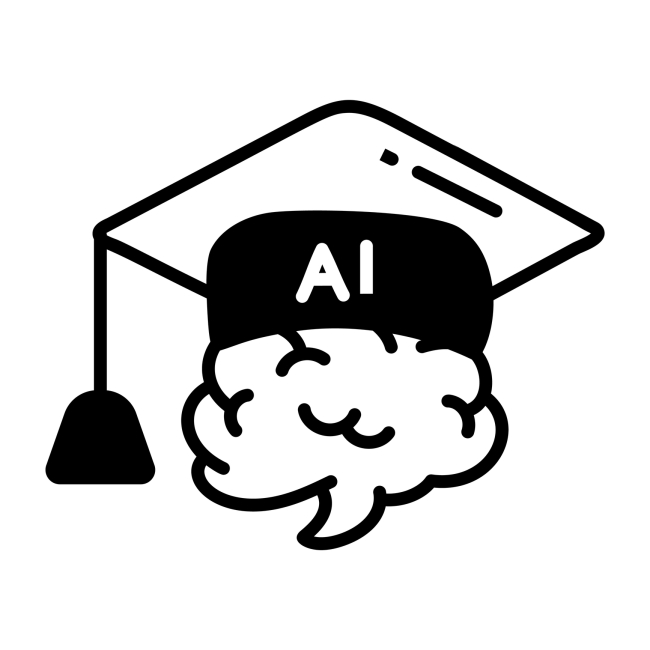You have /5 articles left.
Sign up for a free account or log in.

vectorsmarket/iStock/Getty Images Plus
There’s something in the air this commencement season—in high school gyms and Ivy League tents, wafting up gowns and making eyes itch.
It’s not an allergy—it’s AI anxiety. Graduates walking this spring are stepping into a world where much of what they learned seems obsolete in the face of artificial intelligence.
Take writing, for example: the Class of 2023 is the first to see AI ace standardized tests like the SAT, the first to see AI do their homework and the first to face accusations of AI-related academic misconduct. They are worrying AI will usurp the writing-related jobs they trained for, from newsrooms to magazines to Hollywood. They are looking back on their years of hard work and wondering with dread: Will it all be worthless?
It’s a fair question. Today’s AI is certainly impressive, shocking us day after day with powerful new capabilities. Many are convinced that AI has surpassed human writing; others declare that humans were never so special after all. When linguist Emily Bender coined the famous term “stochastic parrots” to describe AI that spouts text “without any reference to meaning,” OpenAI CEO Sam Altman tweeted, “i am a stochastic parrot, and so r u”—that is, that we are all no better than his company’s AI product.
As an AI researcher, I find these claims frustrating. Yes, we scientists are still debating the details of how AI is and is not humanlike in its use of language. But let’s not forget the big picture: unlike AI, you speak because you have something to say. While AI learns language by statistically analyzing billions of internet words (thousands of human lifetimes’ worth), you learned language by yearning to share what was in your heart. Your first words might have been “mommy” and “daddy,” but certainly not common articles like “the” and “an,” which AI typically starts with. Your knowledge comes not from slurping down the entire internet but from your own experiences in the world: a sun’s warm kisses, a fever’s cruel chills, the raptures and ruptures unique to your life.
This is why you learned to write in school: to empower you to share what lives lonely in your mind—transcendent beauty, injustice unaddressed, insight blazing and sharp and yours. Yes, writing is difficult work, but rightfully so. As writer Annie Dillard says of a new idea, “It is hard to explain because you have never read it on any page … You were made and set here to give voice to this, your own astonishment.”
That is not something AI can do for you. AI’s only goal is conformity: to blend in with text found on the internet. It has no “astonishment” to give voice to, no ideas or experience or wisdom to impart.
So the question to ask about writing is not Will AI make it worthless? but rather What could possibly be more important? In a world flooded with the monotonous slurry AI excels at producing, power lies with those who can—and do—speak for themselves. Never have the skills of independent, critical thought and expression been more vital than in the AI era.
Even so, you might worry: Don’t other people use AI as a powerful tool, a kind of souped-up spell-check that supercharges their productivity? Will I be left behind if I don’t use it, too? Well, yes, AI can be a tool for some—but ask yourself if you want a tool that puts words in your mouth. For years, regular spell-check autocorrected my name to “Martin,” dragging my words into its own conception of the world. AI is subtler and slipperier: biases unintentionally (or intentionally!) built into AI threaten a writer’s independence. If you are writing to right the wrongs of the past, a machine built on the words of the past seems hardly the place to start.
A better place to start is your own words.
Students, now is the time to take an English class. Yes, AI can write you 10 pages on Hamlet tonight—but that assignment isn’t training you for 10 pages on Macbeth tomorrow. Your essay on Shakespeare is empowering you to someday write a petition, or a speech, or, with luck, a love letter: something only you could ever write.
Educators, now is the time to invest in writing courses for your students. Don’t let AI rob them of language, what Alphonse Daudet calls “the key to their [our] prison” and what Toni Morrison calls “the measure of our lives.”
Managers, now is the time to hire thoughtful, talented writers, ones who will write what AI can’t. They are precious in the AI era.
And graduates? Now is the time to trust yourselves. Walk into this world knowing you have the superpower of expression. Hold it dear; know its worth. Let your gowns billow with pride.




